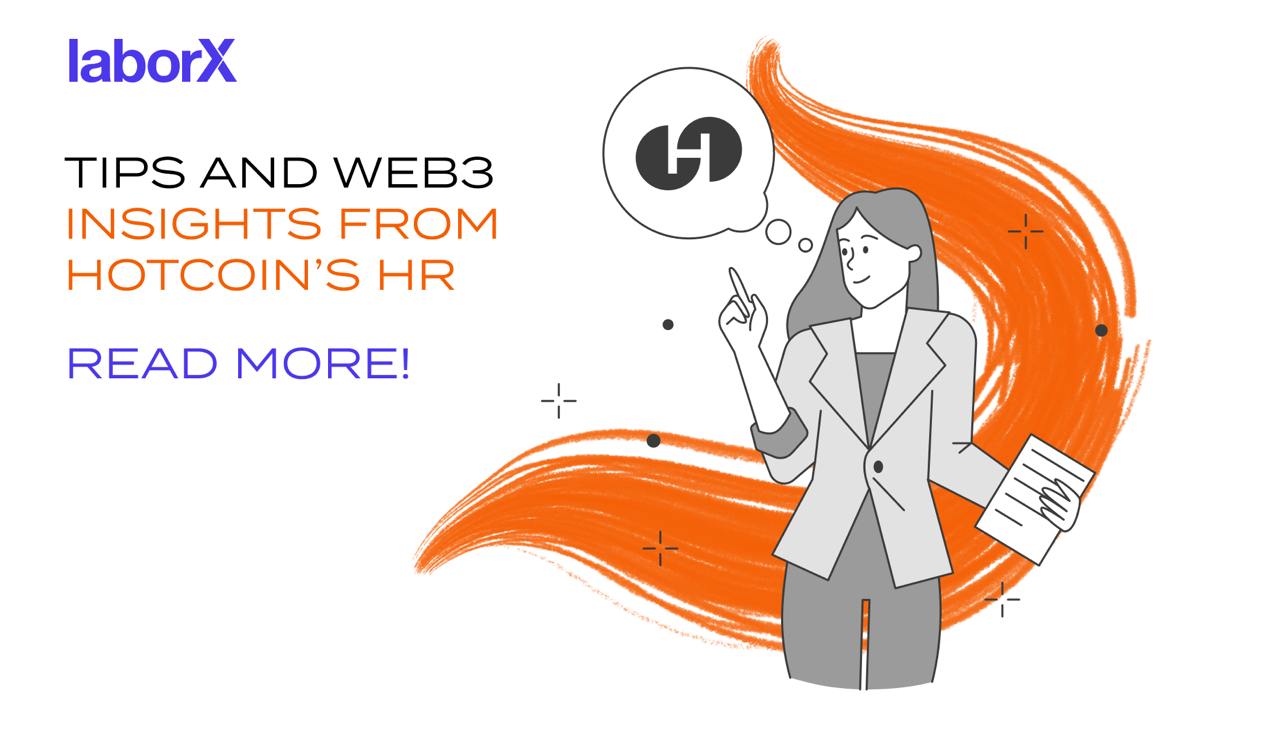
Embracing Change: HR in the World of Digital Assets
Hotcoin’s HR shares her journey from traditional industries to the world of Web3 and crypto, highlighting key insights on thriving in this space.
Read
"By failing to prepare, you are preparing to fail” - Benjamin Franklin
It’s a tight labour market, meaning there’s a shortage of applicants for each job. For Web3 businesses, the stakes are even higher. Hiring a new employee is not a trivial matter. Bring the right person on board and it will be a major boost to the business, potentially setting them apart from the competition in an unforgiving landscape. Give the wrong person a job and, at best, the organisation will be wasting a substantial salary package. In the worst case, it could end up sinking the company for one reason or another.
Good talent is hard to find, and Web3 organisations know they need to assess each candidate carefully. If you’re applying for a job in the crypto sector, be prepared to be scrutinised: your CV, your track record, your references, even your social media presence.
And, on top of that, you can expect an interview, where you’ll be put through your paces. Not only should you expect to answer questions that will prove your Web3 knowledge in whatever area is relevant (as a developer, in marketing, community management, and so on), but also to show you’re a good fit for the organisation, actually want the job, and can add value to the company.
Here are five questions it’s likely you’ll be asked at some point, and how to go about answering them in a way that impresses your interviewer.
Make sure you do some basic preparation before you get to your interview, whether it’s online or in person. In both cases, make sure you leave plenty of time to get there. (For a Zoom interview, that includes making sure you have a good internet connection, and that you leave a contingency of several minutes for any tech problems, like the obligatory last-minute Zoom update.)
Remember that body language accounts for a significant percentage of communication. Make sure you’re well turned out, neatly dressed (though probably not wearing a suit for a Web3 job, as you would in TradFi), and so on. If it’s an online interview, ensure the area behind you and in-view to the camera is tidy – don’t rely on a filter or background, since these can glitch, and sometimes you’ll need to turn them off if you’re having CPU or bandwidth issues. Keep an open body posture, smile, and be friendly. Above all, try to keep things as natural as possible. A forced grin isn’t going to do you any favours.
When it comes to answering questions, it’s fine to take a little time to think. Don’t feel under pressure to rush in with an answer – though the more preparation you can do beforehand, the better. And in each case, try to read between the lines. Is there something more important they’re trying to find out, beyond what the question is about on the surface?
This is often the first question an interviewer will ask. Because it’s such a general and open question, it can be hard to answer. Without thinking a little about this one in advance, there’s a good chance your mind will go blank or that your answer will be jumbled or confused. Fortunately, a few minutes spent thinking about this in advance is all you really need.
Give a brief summary of key events and milestones in your life, ending with how you came to be applying for the job. This could include where you’re from, what you studied and why, and how you became interested in this kind of work. Most people who work in Web3 have some kind of reason they got involved; it’s rarely something they simply happen to find themselves doing, as is so often the case with other sectors.
If you have relevant Web3 experience, make sure you include that – particular projects you’ve worked on in the past, unusual roles, or special interests. You don’t need to overdo it (and don’t feel the need to exaggerate or try to make your story more interesting than it really is – that risks sounding fake), but give the interviewer enough to go on and to open the way for further questions.

This is a common question, and it’s completely understandable from the employer’s point of view. As a well-qualified Web3 talent, you have the pick of many businesses. What’s special about this one?
However, there’s more to this question than may first meet the eye. In order to be able to answer this question well, you need to fully understand the nature of the organisation, what they do, their values and culture, who they have partnered with, any publicity they have had, and so on.
This question serves as a ‘shibboleth’: a shortcut that immediately tells the interviewer whether you have done your research or not. It’s a fast way for them to figure out whether this job actually means anything to you, or whether you’re just turning up to the interview and going through the motions. Someone who tries to blag their way through an interview without bothering to find out much about the company obviously isn’t going to be much of an asset to the business.
There’s no shortcut to this one. Prepare by reading their website and any documentation or white papers, checking out their product (and actually downloading/using it), looking in the news, joining their Discord, and so on. Find out the good, the bad, and possibly the ugly, and gain a genuine sense of why you would want to work at an organisation like that. What they do should be important to you, but also how they do it: their organisational structure, how they treat their community, what their vision and strategy is for expansion, and so on.
A related issue (assuming they don’t bring this up separately), concerns what it’s like to work at the company. Organisational culture is a big deal for employees. If you’re serious about working somewhere, you will certainly have looked into their work environment. HBR has some good advice on this one.
The organisation’s employer branding and workplace culture should align closely to your preferred environment. (If it doesn’t, then that’s a red flag for you – and the interviewer will think the same.) They may ask you to discuss the culture where you’ve worked before, and what suits you best. For example, you might be happiest in a small, friendly organisation, where everyone has a high degree of responsibility and autonomy, and you are left to solve your own problems – but where support is available if you need it and you can expect to work closely with other employees when required. Make sure you link your previous experiences, and places where you feel you’ve thrived, with the culture at the organisation at which you’re being interviewed.
Another related question is why you left (or plan to leave) your previous job. It’s best to be honest here, but not too negative about your last organisation or the people there (even if there were problems). For a start, Web3 is still a small world, and it’s likely your interviewer will be able to follow up and find out more about you and the circumstances under which you left, if they want. Moreover, giving a straight (but tactful) answer will give the interviewer helpful insights into what kind of person you are and what you look for in an employer.
This is a classic interview question, and not always an easy one to answer! After all, do too convincing a job and you might ruin your chances of getting the job. On the other hand, pretending you don’t have any weaknesses is unconvincing.
Once again take some time in advance to consider this one. Think about one or two weaknesses you have, but also how you have been working to address these. For example, have you undertaken particular training? The interviewer doesn’t just want to know what you’re not good at, but how you’re looking to advance your skill set and ensure that any weaknesses you do have don’t hold you (or the organisation) back.
If you need inspiration, there’s a good chance that at least one of these common weaknesses applies to you.
On some occasions, you’ll be headhunted for a role. Web3 organisations actively seek good candidates, and if that’s the case, you probably won’t get asked this. If you’re applying for a vacancy, though, there’s a good chance you’ll be competing against at least several other candidates, and you’ll need to set yourself apart from them.
Make sure you have read the job description carefully and know what is expected from you. You’ll need to demonstrate how the skills you have can be applied to different aspects of this job. Ideally, you’ll be able to prove you’re the right fit by showing the interviewer that you’ve already delivered successfully in a similar setting.
However, this question also gives you the opportunity to show that you really are interested in the job. If you’ve done your research, you’ll know all about the culture, challenges and opportunities offered by the role and company – allowing you to demonstrate that you’ve thought carefully about working there in a way that other candidates may not have done.
This question isn’t just about your personal ambition. It’s about whether your plans and goals align with those of the company. They will want people who are committed to the business and helping make it a success. If you’re someone who is likely to move on to a different opportunity in a year, that’s not ideal from the recruiter’s point of view. Recruitment is an expensive business and they don’t want to be repeating the process, and losing any institutional knowledge you have built up, in a few months’ time.
On the other hand, if you can see yourself progressing upwards within the company, using the opportunities they give you to learn, take on greater responsibility, and provide more value in the future – that will be worth a lot to them.
Don’t forget to come armed with a few questions of your own. As with your other answers, these should show you have taken the time to research the company, have a genuine interest in what they do, and can see yourself working there.
One question you’ll want answered is about your salary. In some cases, this will be openly stated from the outset. Sometimes, though, it’s surrounded by all kinds of cloak-and-dagger antics. In the worst cases, you won’t learn this until you’re well into the recruitment process. If the job pays less than you’re expecting, this can be an enormous and frustrating waste of time.
It’s best not to bring up questions about salary in the interview itself unless the interviewer does. (At the very least, you should have established a likely pay range before you turn up.) If the discussion does arise, make sure you know what similar roles generally pay – in other words, what your skills and experience are worth on the open market. If you’re asked what your expectations are, give a range, and remember that it’s generally easier to negotiate downwards than upwards (from your perspective).
The interviewer may also ask whether you’re considering other job offers, or applying for other roles. They will want to know how serious you are about working at the company. Are they your top choice? Or is this an ‘insurance’ offer, or one of many irons in the fire? You don’t have to say where those offers have come from, but be honest about whether you’re looking elsewhere.
Good luck! Although, if you do your research and put in the work in advance, you shouldn’t need it…

Hotcoin’s HR shares her journey from traditional industries to the world of Web3 and crypto, highlighting key insights on thriving in this space.
Read
Discover how Web3 is reshaping HR practices with insights from a leading expert in the field.
Read
Discover Base's innovative L2 solution addressing scalability, security, and user experience challenges in crypto. Learn about Base Incubator by LaborX, fostering growth and innovation within the Base ecosystem.
Read